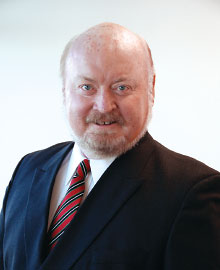Paul Burke, Who Expanded Significance of APA Foundation, Dies at 73
Abstract
The former executive director of the APA Foundation created collaborations to expand understanding of psychiatric disorders and access to mental health services.
Paul Burke, who led the American Psychiatric Association Foundation from 2007 to 2016 and helped focus its mission on mental health issues that were both national in scope and local in application, died in October. He was 73 years old.

Paul Burke boosted the effectiveness and profile of the APA Foundation during his decade of leadership.
“Paul dedicated many years of work to improving mental health care and increasing access to quality mental health services for underserved populations,” said APA CEO and Medical Director Saul Levin, M.D., M.P.A. “We are deeply honored to have known and worked with Paul. He was a blessing in our lives, and we will forever carry him in our hearts.”
The foundation oversees 13 public educational programs and partnerships, 30 awards, and nine fellowships, which together have expanded public awareness of mental health issues, improved the mental health of diverse populations, and supported the psychiatric profession.
As executive director, Burke raised the profile of the foundation both externally and among APA’s membership, said his successor, Daniel Gillison Jr. His influence went beyond the formal confines of his job as well. Former coworkers recalled how he often counseled them to balance the demands of job with those of home and family.
Burke came to APA after serving as president and CEO of CureSearch National Childhood Cancer Foundation, following an earlier career in government, legislative affairs, and business.
Once at the APA Foundation, he expanded existing programs and developed significant new ones. For instance, he inherited the program Typical or Troubled? but broadened its impact and visibility, said Gillison. The program trains teachers, coaches, counselors, and other school personnel to recognize signs and symptoms associated with mental illness in students and refer them for help. The program lay especially close to Burke’s heart because he had a nephew who died by suicide.
Typical or Troubled? so far has trained 70,000 school personnel in 1,400 schools enrolling more than one million students.
He oversaw the expansion of the foundation’s Awards for Advancing Minority Mental Health program and worked with large corporations to make the economic and moral case for good mental health coverage in employers’ insurance plans through the Center for Workplace Mental Health.
Burke also shepherded development of several new programs during his tenure. He served as an infantry officer during the Vietnam War and so was acutely aware of the mental health needs of service members returning from battle in the 21st century. As a result, the foundation joined with the Give an Hour program to expand access to care for veterans in their home communities. He also began the foundation’s deep involvement with the Stepping Up Initiative, a collaboration with county governments around the country to address the warehousing of people with mental illness in the nation’s jails and prisons. The foundation forged a collaboration with the National Association of Counties, the Council of State Governments, and the U.S. Department of Justice’s Office of Justice Programs, culminating in a summit in Washington, D.C., in 2016.
Burke also helped develop the Judges and Psychiatrists Leadership Initiative, which sends teams of judges and psychiatrists to teach judges in state and local courts around the country about mental illness and alternative ways to manage people with psychiatric disorders.
“He was larger than life,” said Gillison. “He was a friend and a coach and a leader.” ■



